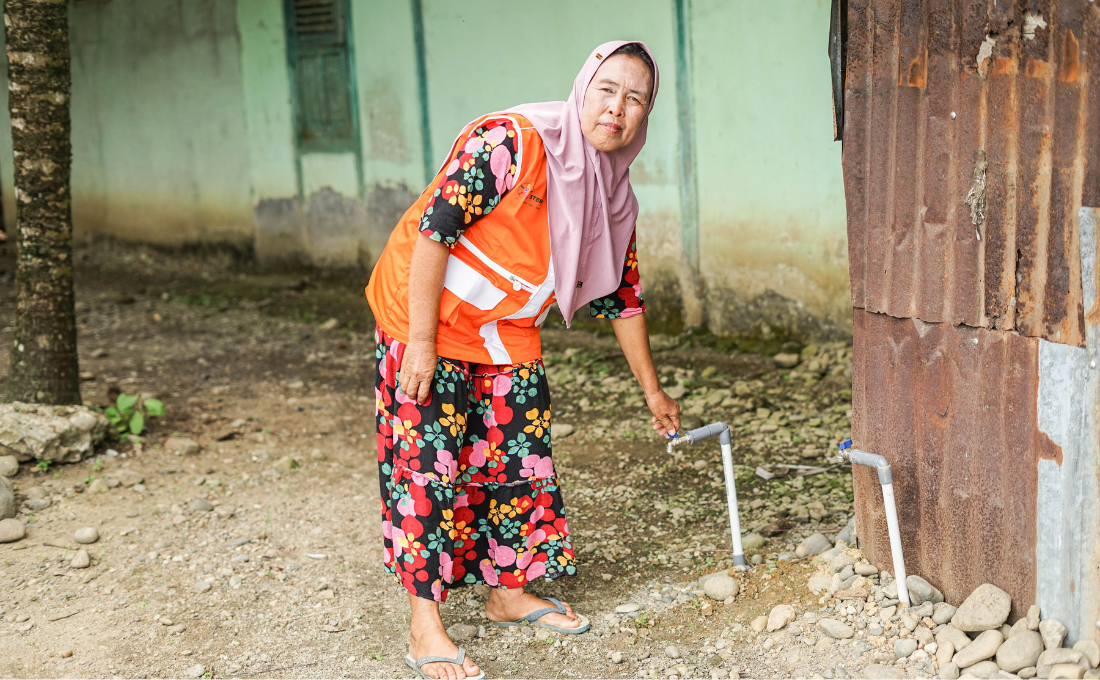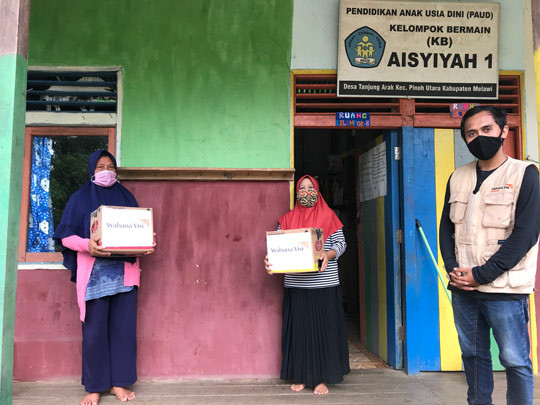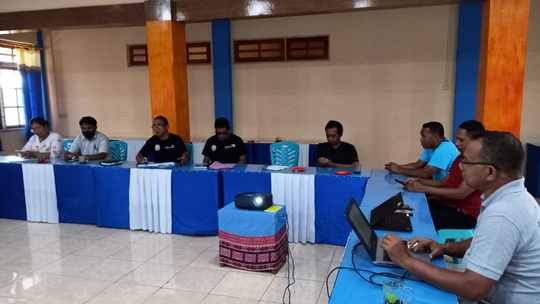Establishing Water Access for Rural Communities: Gotong Royong for Sustainable Access

"I want to see children and communities no longer bathing and using river water for daily needs," said Wak Anang*. This middle-aged man is the administrator of the Water Committee of one of WVI's assisted villages. He continued, "I believe this can be realised by involving many villagers in this activity. There are many challenges but I believe what I am doing is a good thing and for the good of the children and the community here. So I continue to fight for this until now,".
After a lifetime children and villagers only utilise dirty river water, at the end of 2023, 502 villagers in South Bengkulu have access to clean and safe drinking water for the first time. This was all achieved thanks to the participation of the entire village community, both as villagers who worked together to build the clean water network, the Water Committee, and the village government.
Before a tap was installed in front of the house to deliver clean water, children, mothers, fathers, young and old, would gather at the river every afternoon. Until evening, the river was crowded with various activities such as bathing, washing, and defecating. In fact, the river water is also what the community uses for cooking and drinking. Because there are no other water sources in the village, the community still uses it even though it is not suitable for consumption.
"During the dry season, we always have water shortages. Our children often get sick with itching, fever, and some get diarrhoea," said Ibu Nili, a housewife who represents women's aspirations in the Water Committee. She also shared, "At that time, I was invited to join the Water Committee because I wanted change for the better. At first, I was often underestimated by the community. Why would a woman become an administrator when this is a man's job and it's hard. But until now, I still persist because I believe this will be successful and we can get access to water that is clean and more suitable for drinking,".
Seeing how the Water Committee has the passion to change the quality of life of children and communities in the village, WVI through the WASH BP project decided to participate. With the goal of making the village's children live clean and healthy, the WASH BP team and the community conducted a series of surveys and designed an appropriate clean water network development model.
"We made it using a filtering process, there are two broncaptering units there that are made and flowed into the reservoir. In the reservoir there is also a stone filter so that the water flowing to the residents is really clean water and is suitable and even safe for drinking. However, it is safer to cook the water before making it into drinking water," said Wak Anang.
Broncaptering is one of the Simple Water Treatment Installation Systems (SiPAS) used for drinking water supply in raw water springs. This method serves to protect and capture water from the spring to be collected and channelled by transmission pipes to the reservoir. Based on the context and water needs in the village, broncaptering became a suitable method that was agreed upon by the community.
The hard work of the Water Committee began. The village's clean water access plan must be realised and gain the support of the entire community as it is done through gotong royong or mutual cooperation. "We, the committee, invite all communities to work. We also remind everyone of the work schedule and what will be done each day. Every day we coordinate with WVI and also learn the technicalities before working with fellow administrators and residents for this clean water. If there is no committee, it will be chaotic and may not even work, so the role of this committee is very important in activities like this," said Silmantoro, one of the committee members.
Coordinating hundreds of villagers to work together for 60 days is not an easy task. In addition to labour, the villagers also contributed building tools and food. Wak Anang recounted how the Water Committee organised who worked each day. Coordination also involved religious and community leaders in the village. Various challenges ranging from the construction site being difficult to access to how to balance the roles of each resident so that no suspicion or conflict arises must be prepared.
"Some of the workers transport heavy materials such as stones, cement, sand to where we work. It passes through a ravine on the edge of a watercourse about 20 metres high. It is steep and extreme to get to the work site at the water source. We invited everyone to join us. We also divided the tasks with our fellow committee members. One of them remembers the gotong royong schedule every night. Pak Silmantoro is part of the mosque management, who reminds us every Friday and religious leaders. Mingki is in charge of the neighbourhood, and so are the others. Every day, we, the committee, also take turns working," Wak Anang recounts his hectic duties as a Water Committee member.
Guarding the process of building a clean water network with a total cost of IDR 366,373,000 also demands transparency in the work of the Water Committee. Not only coordinating, the Water Committee also has the task of ensuring that no community feels unfairly treated, excluded, or feels that their hard work is not comparable to that of their neighbours. Challenges like these require wisdom and cohesiveness amongst the organisers so that they can be resolved properly. One of the steps the member took to mitigate this was to include female representation on the committee.
"Women are usually more meticulous, so we invited Bu Nili for our treasurer position. That's why we need a woman in the Water Committee, and this is also the committee's representation in the community," said Wak Anang, "We rarely see women for this, but Bu Nili is enthusiastic and willing to work for the community and for the children in our village, and she is also active. Bu Nili is an example for women in the village to be able to participate in gotong royong too. Because many women don't want to do this kind of work, especially when it's hard work. So because there is a woman who started it, other women don't hesitate to get involved,".
The old proverbs "first comes hardship, then comes the fruit" is true in this village. The hard struggle has paid off, and the results have wiped out all the tiredness and obstacles that had occurred. Now, children can bathe twice a day, wash their hands with soap in running water, have proper and sufficient drinking water for daily consumption, the clothes they wear are always clean, and most importantly, children are increasingly exposed to a clean and healthy lifestyle.
The importance of access to clean water in the village is increasingly felt when the Water Committee imagines the condition of children if water is not present in the village. Mingki, who also joined the Water Committee said, "Clearly, there must be a lot of diseases, many children are unhealthy and there are even many stunted children in the village. Because this is a basic thing that must be fulfilled, from defecating to eating we need clean water. If there is no clean water, there will be many diseases in the village caused by dirty water". And the villagers no longer want to be confined to such a life.
Once the village has access to clean water, it doesn't mean the process stops here. In accordance with Sustainable Development Goals 6 regarding universal access to clean water and sanitation, this access needs to be maintained and sustained. The Water Committee's work in the village extends to advocacy at the village and district levels.
"We have planned for the issuance of the village regulation on the management of this water facility. In early January (2024), we had a meeting with the village government and WVI to formulate and issue a Village Regulation on this matter, starting from how to collect retribution, maintenance, and we even hope that the village will have budget to help the operation and maintenance of this clean water facility so that it can last until our children and grandchildren. And we hope that we can be more united in maintenance because we realise this is the most important part and this is often reminded by WVI so that the sustainability lasts for a long time," Wak Anang concluded.
*Wak is a greeting from the South Bengkulu region that refers to an older male figure.
Author: Mariana Kurniawati (Communication Executive)
Contributor: Sendi Normansyah (WASH BP staff in South Bengkulu)



